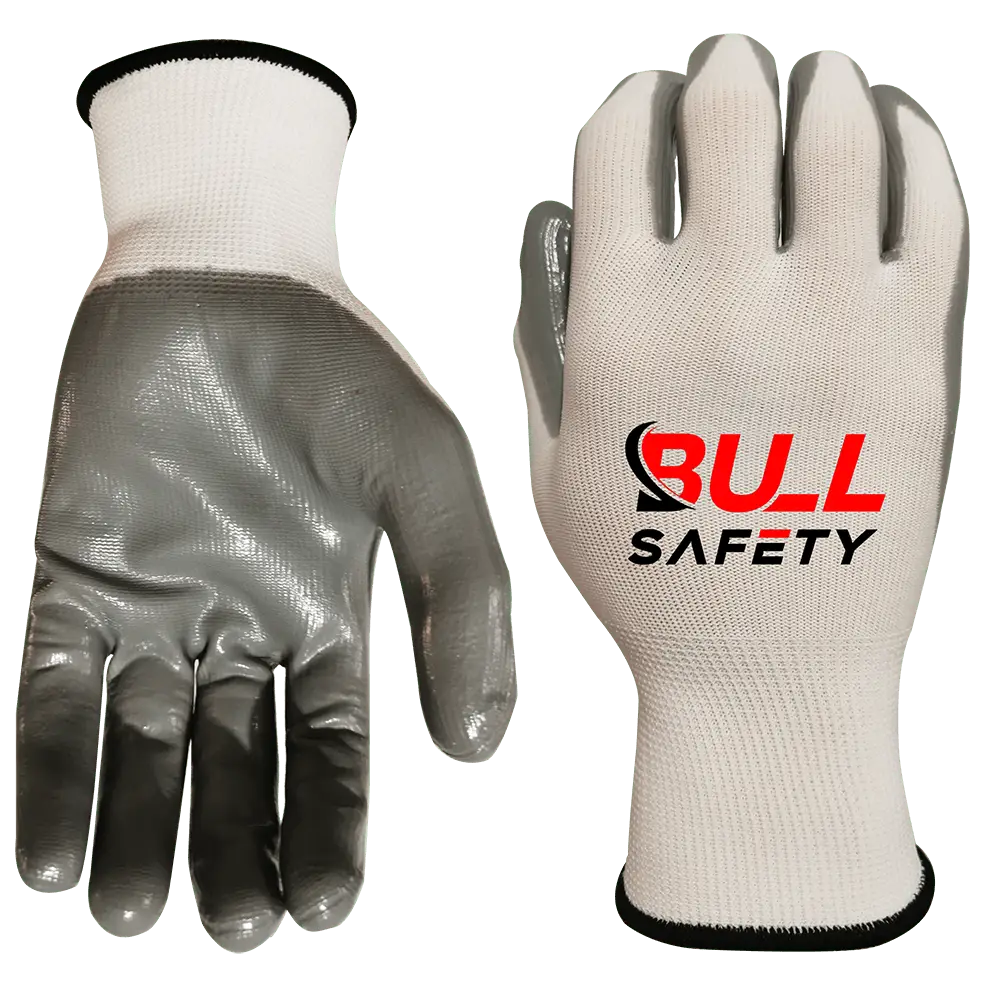
When it comes to safety, many workers look for gloves that offer both protection and durability. But are nitrile-coated gloves shock resistant?
Nitrile-coated gloves are primarily designed for oil, chemical, and abrasion resistance. They do not provide protection against electrical shocks; for electrical work, specialized insulating gloves are required.
I often get this question from customers looking for impact or electrical protection. While nitrile gloves are great for chemical handling and grip, they do not insulate against electricity. If you need gloves for electrical safety, I recommend rubber insulating gloves that meet EN 60903 or ASTM D120 standards.
Are PU-Coated Gloves Better Than Nitrile-Coated Gloves?
People often ask me which gloves are better: PU-coated or nitrile-coated gloves? The answer depends on the application.
PU-coated gloves provide higher dexterity and are ideal for tasks requiring precision, such as electronics assembly. Nitrile-coated gloves offer superior durability and resistance to chemicals and oils, making them suitable for industrial applications.
PU-Coated Gloves
Polyurethane (PU)-coated gloves are lightweight and provide excellent dexterity. I recommend them for assembly work, electronics handling, and any task that requires precision. The snug fit enhances tactile sensitivity, making these gloves a top choice for delicate work. However, they lack the durability and chemical resistance of nitrile-coated gloves.
Nitrile-Coated Gloves
Nitrile-coated gloves, on the other hand, are more durable and provide excellent resistance to oils, chemicals, and abrasion. They’re the best option for automotive work, construction, and heavy-duty industrial applications where exposure to rough surfaces and liquids is common.
| Feature | PU-Coated Gloves | Nitrile-Coated Gloves |
|---|---|---|
| Dexterity | High, flexible | Moderate, thicker |
| Durability | Lower, less resistant to wear | Higher, resistant to oils and abrasions |
| Chemical Resistance | Limited | Excellent, protects against oils and chemicals |
| Grip | Moderate | Excellent, especially in wet or oily conditions |
| Best Use | Light assembly, electronics, fine handling | Automotive, chemical handling, heavy-duty tasks |
When choosing between the two, I always ask customers about their specific job tasks. If you need more dexterity, PU is the way to go. If you need toughness and protection, nitrile is the better choice.
Can I Use Nitrile Coated Gloves for Screen Repair?
Many technicians use gloves when repairing screens, but is nitrile the right choice?
Yes, nitrile-coated gloves are suitable for screen repair tasks, as they prevent fingerprints and provide a good grip on delicate components.
One of the biggest concerns when working on screens is avoiding smudges and contamination. Nitrile gloves offer great oil resistance, preventing fingerprint marks on delicate surfaces. They also provide enough sensitivity for handling small screws and electronic components.
For best results, I always recommend using smooth nitrile gloves that fit snugly. Loose gloves can make handling small parts difficult. Powder-free nitrile gloves are also ideal because they won’t leave residue behind.
| Feature | Nitrile Gloves for Screen Repair |
|---|---|
| Dexterity | High, allows for detailed work |
| Oil Resistance | Excellent, prevents fingerprints |
| Grip | Moderate, depending on coating |
| Comfort | Comfortable, especially for long tasks |
| Best for | Handling small components, screen cleaning |
For screen repair professionals, nitrile gloves are a solid option to keep delicate electronics clean while maintaining a good grip.
How to Clean Nitrile Coated Garden Gloves?
Gardening gloves get dirty quickly. So how can you clean nitrile-coated gloves without damaging them?
To clean nitrile-coated garden gloves, rinse them with water and apply mild soap. Use a soft brush for stubborn dirt, then air dry the gloves away from direct sunlight.
I always tell customers that keeping gloves clean extends their lifespan. Here’s the best way to do it:
- Rinse Off Dirt: Hold the gloves under running water to remove loose soil and debris.
- Use Mild Soap: Apply a small amount of gentle soap or detergent to the gloves.
- Scrub Gently: A soft brush works well to remove stubborn dirt without damaging the coating.
- Rinse Thoroughly: Wash off all soap residue to prevent build-up.
- Air Dry: Lay the gloves flat or hang them to dry naturally—avoid direct sunlight or heat, as it can weaken the nitrile coating.
| Cleaning Step | Action |
|---|---|
| Rinse Off Dirt | Wash away large soil particles |
| Apply Soap | Use mild detergent |
| Scrub | Use a soft brush to remove dirt |
| Rinse Thoroughly | Remove soap and residue |
| Drying | Air dry the gloves, no direct heat |
By following these steps, your gloves will last longer and stay in great condition.
Conclusion
Nitrile-coated gloves provide excellent protection against oils, chemicals, and abrasion, but they are not shock-resistant. Whether you need gloves for precision tasks like screen repair, durable options for industrial work, or a reliable choice for gardening, nitrile gloves are a versatile and effective solution. I always recommend choosing gloves based on your specific needs to get the best performance and comfort.



